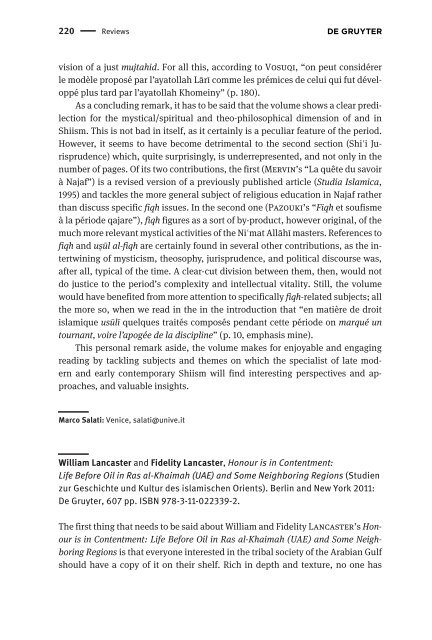0021-1818_islam_98-1-2-i-259
0021-1818_islam_98-1-2-i-259
0021-1818_islam_98-1-2-i-259
You also want an ePaper? Increase the reach of your titles
YUMPU automatically turns print PDFs into web optimized ePapers that Google loves.
220 Reviews<br />
vision of a just mujtahid. For all this, according to Vosuqi, “on peut considérer<br />
le modèle proposé par l’ayatollah Lar\ comme les prémices de celui qui fut développé<br />
plus tard par l’ayatollah Khomeiny” (p. 180).<br />
As a concluding remark, it has to be said that the volume shows a clear predilection<br />
for the mystical/spiritual and theo-philosophical dimension of and in<br />
Shiism. This is not bad in itself, as it certainly is a peculiar feature of the period.<br />
However, it seems to have become detrimental to the second section (Shi^i Jurisprudence)<br />
which, quite surprisingly, is underrepresented, and not only in the<br />
number of pages. Of its two contributions, the first (Mervin’s “La quête du savoir<br />
à Najaf”) is a revised version of a previously published article (Studia Islamica,<br />
1995) and tackles the more general subject of religious education in Najaf rather<br />
than discuss specific fiqh issues. In the second one (Pazouki’s “Fiqh et soufisme<br />
à la période qajare”), fiqh figures as a sort of by-product, however original, of the<br />
much more relevant mystical activities of the Ni^mat Allah\ masters. References to<br />
fiqh and usul al-fiqh are certainly found in several other contributions, as the intertwining<br />
of mysticism, theosophy, jurisprudence, and political discourse was,<br />
after all, typical of the time. A clear-cut division between them, then, would not<br />
do justice to the period’s complexity and intellectual vitality. Still, the volume<br />
would have benefited from more attention to specifically fiqh-related subjects; all<br />
the more so, when we read in the in the introduction that “en matière de droit<br />
<strong>islam</strong>ique usuli quelques traités composés pendant cette période on marqué un<br />
tournant, voire l’apogée de la discipline” (p. 10, emphasis mine).<br />
This personal remark aside, the volume makes for enjoyable and engaging<br />
reading by tackling subjects and themes on which the specialist of late modern<br />
and early contemporary Shiism will find interesting perspectives and approaches,<br />
and valuable insights.<br />
Marco Salati: Venice, salati@unive.it<br />
William Lancaster and Fidelity Lancaster, Honour is in Contentment:<br />
Life Before Oil in Ras al-Khaimah (UAE) and Some Neighboring Regions (Studien<br />
zur Geschichte und Kultur des <strong>islam</strong>ischen Orients). Berlin and New York 2011:<br />
De Gruyter, 607 pp. ISBN 978-3-11-022339-2.<br />
The first thing that needs to be said about William and Fidelity Lancaster’s Honour<br />
is in Contentment: Life Before Oil in Ras al-Khaimah (UAE) and Some Neighboring<br />
Regions is that everyone interested in the tribal society of the Arabian Gulf<br />
should have a copy of it on their shelf. Rich in depth and texture, no one has


